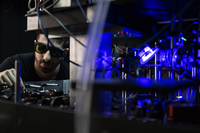A team of students and researchers led by Professor Joseph Thywissen, in collaboration with a theory team from JILA at the University of Colorado Boulder, has measured unitary p-wave interactions for first time in ultra-cold atoms in work published in the 12 January 2023 issue of Nature.
Over the past few decades, gases of ultra-cold atoms trapped in optical lattices have emerged as a promising laboratory "playground" for studying many-body phenomena. This is due in part to the exquisite control experimentalists have over atomic properties such as tunneling rates or inter-particle interactions. While continuous tuning of s-wave interactions (which have zero relative angular momentum, L=0) is now a common tool for atomic physicists, less can be said for control of the more exotic p-wave interactions, which have L=1. This is because their resonant enhancement via a magnetic Feshbach resonance also enhances undesired loss processes such as three-body recombination.
By isolating pairs of atoms in sites of a three-dimensional optical lattice, the UofT team was able to circumvent three-body recombination, thus opening the door to free tuning the p-wave interaction among each atom pair. Strikingly, the observed interaction energy was found to agree with a simple analytic theory across all interaction regimes, including the unitary limit, at which the interaction strength attains its theoretical maximum. The experimental team also demonstrated coherent manipulation of the p-wave pairs.
The understanding and control of p-wave interactions in ultra-cold atoms provided by this work could lay the groundwork for the realization of exotic many-body states of matter, and also extends the study of ultracold lattice systems into the multi-orbital regime.
The collaboration team features a wide range of Canadian and international researchers, also reflecting our diverse physics community here of at the University of Toronto. Co-first authors Vijin Venu and Peihang Xu are were international PhD students when the work was done and are now gainfully employed (at Quantum Valley Ideas Lab and at Morgan Stanley, respectively). Frank Corapi is a Canadian PhD student, and Dr. Cora Fujiwara is a postdoc from the United States. The experimental team is excited to have Robyn Learn and Ben Driesen on board to continue and expand the work. The theory side is also international, with faculty and students from Colombia, Brazil, Germany, and Russia. The Department of Physics congratulates both the experimental and theoretical teams for their hard work.
Want to join the experimental team here at University of Toronto? Interested and motivated undergraduate students, graduate students, and postdocs should contact Professor Thywissen. The group is committed to a promoting a diverse and inclusive learning and research environment.
For more information see the following links:
- A&S News story " "UofT experimental physicists dip their toes into the quantum ocean": https://www.artsci.utoronto.ca/news/u-t-experimental-physicists-dip-their-toes-quantum-ocean
- UofT Press release: https://www.eurekalert.org/news-releases/976250
- Paper link: https://www.nature.com/articles/s41586-022-05405-6
- Thywissen group website: https://www.thywissenlab.ca
- Rey group website: https://jila.colorado.edu/arey
- JILA press release: https://jila.colorado.edu/news-events/articles/atoms-do-twist

